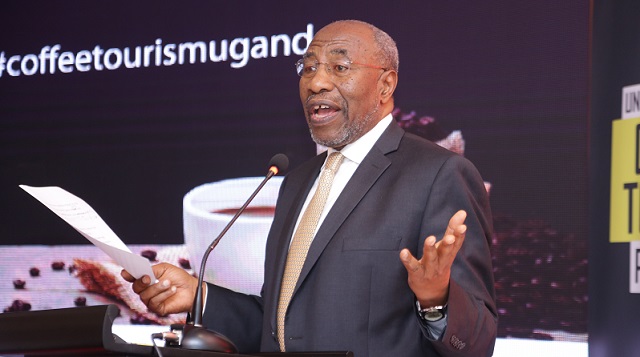
Kampala, Uganda | JULIUS BUSINGE | Prime Minister Ruhakana Rugunda is optimistic that the synergy between the tourism and coffee sub-sectors will be instrumental to getting Uganda’s economy to middle income status.
Rugunda was speaking as Chief Guest at the first annual Coffee and Tourism Symposium and Exposition at Golden Tulip Hotel in Kampala at the end of last week.
The symposium was held under the theme ‘unlocking Uganda’s Coffee Tourism Potential’.
Rugunda said that the exploration of the linkage between coffee and tourism, with each sector reinforcing the other, was an important innovation which everyone saluted, welcomed and supported.
“Coffee is a priority sector for Uganda, generating approximately 18 -20% of our foreign exchange over the past 20 years while contributing to the income of millions of rural households,” he said,
On the other hand, he added that tourism is the highest foreign exchange earner and that combining the two sub-sectors will have a positive impact on the Ugandan economy.
The symposium was organised by Coffee Tourism Uganda (CTU), in collaboration with the Uganda Tourism Board under Ministry of Tourism, Wildlife and Antiquities and Uganda Coffee Development Authority (UCDA), Ministry of Agriculture, Animal Industry and Fisheries.
It brought together key stakeholders in the coffee and tourism sub-sectors to deliberate on how the gains and potential in both sub-sectors can be enhanced.
Keynote speaker and renowned coffee-tourism expert, Glenn Jampol, a Costa Rican, said that Uganda’s coffee had a reputation among global coffee connoisseurs for being great and well-balanced.
“Coffee has the potential to become a commodity that changes communities through linking it to tourism. However, there is no coffee tourism without sustainability,” Jampol, who is also the President and co-owner of Finca Rosa Blanca Coffee Plantation Resort and a celebrated international sustainable tourism professional said.
Adding, “Tourism is never about the price tourists pay but about the value. It’s not about more tourism but better tourism.
He said that in Costa Rica they get about three million tourists per year who pay over $1,100 each. He said that people will gladly pay a lot more across the board for unforgettable experiences of quality.
Joan Kantu Else, the Coffee Tourism Uganda, chief executive officer said that coffee and tourism supplemented each other, hence the motivation to organise this coffee tourism symposium.
“We need the youth in the coffee growing communities to partner with us as tour guides, since they know the local story better,” Kantu said.
On his part, Stephen Asiimwe, the CEO, Uganda Tourism Board, emphasized Uganda’s globally recognised biodiversity uniqueness, adding that bringing coffee consumers to the farms, as the Coffee Tourism campaign espouses, will also encourage incremental earnings for farmers and those in the hospitality and tourism industries.
“It is anticipated that this symposium will clearly underscore the opportunities and benefits associated with combining coffee and tourism along the value chain,” Asiimwe said.
The tourism industry currently contributes 10% to Uganda’s GDP, making it the leading foreign exchange earner. This translates to more than Shs5.1 trillion ($1.4 billion) annually, and is projected to earn about Shs10 trillion ($2.7 billion) by 2020.
On the other hand, the Government of Uganda, through the Coffee Roadmap, aims to accelerate coffee exports from the current 4.6 million (60kg) bags per year to 20 million (60 kg) bags by 2025.
At least 180 delegates and 20 exhibitors attended the inaugural Coffee and Tourism Symposium and Exposition, including tour operators, coffee farmers, hoteliers and others involved in the hospitality and coffee industry.
 The Independent Uganda: You get the Truth we Pay the Price
The Independent Uganda: You get the Truth we Pay the Price





